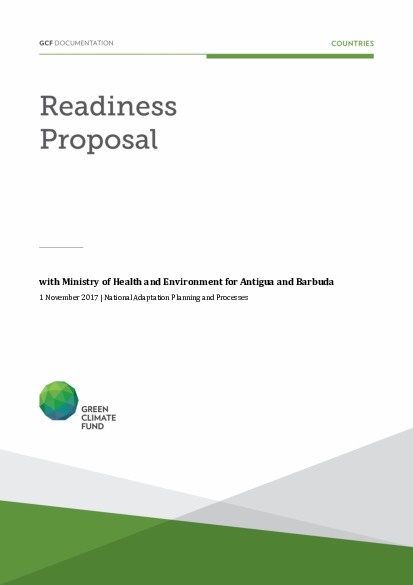National Adaptation Planning support for Antigua and Barbuda through Ministry of Health and Environment

National Adaptation Planning support for Antigua and Barbuda through Ministry of Health and Environment
The goal of this grant is to contribute to the global goal on adaptation in the Paris Agreement – to enhance adaptive capacity, strengthen resilience and reduce vulnerability to climate change (Article 7.1.). The project will achieve this goal by engaging in adaptation planning processes and supporting implementation by developing national climate assessments with climate resilient sector plans for 6 sectors, synthesizing priority actions into a National Adaptation Plan (NAP), and conducting technical studies in preparation for implementation of new climate regulations. The overall outcome is to make financing flows consistent with a pathway towards climateresilient development in Antigua and Barbuda. Specific outcomes of the NAP project are:
- Adaptation baselines are established through data collection, compilation, and comprehensive climate change risk mapping.
- Vulnerability Risk Assessment and Adaptation Plans are developed for up to 3 Government agencies, 3 communities/NGOs and 3 Private Sector entities using a learning by doing capacity building approach.
- The National Adaptation Plan is prepared according to national law, including the conduct of strategic impact assessments (SIAs), approved by Cabinet, and published in the Gazette.
- A sustainable financing strategy is developed to facilitate further SIAs development (only 20 SIAs are conducted under this funding proposal), NAP implementation via the SIRF Fund in the Government, community, and Private Sector entities.
At the completion of the NAP Readiness project, Antigua and Barbuda will have the following:
- A fully developed NAP that has undergone public consultation and with meaningful inputs from government agencies, the private sector, and communities;
- Adaptation data will be collected and used to prepare detailed local area plans for the approval by the Physical Planning department;
- Detailed mapping in EIMAS of Adaptation data collected during the NAPs Process for the use by the planning agencies, banks and insurance;
- Key sectors will be able to understand climate risk and identify adaptation planning measures and use this to include adaptation activities within national planning budgets;
- The private sector and NGOs will identify adaptation requirements within the new draft Antigua and Barbuda Paris Agreement Regulations and develop the skills to design and implement projects and provide proof of concepts for NAP implementation;
- 20 SIAs and the methodology developed to produce strategic adaptation assessments plans beyond the life of NAPs;
- Improved track record of Antigua and Barbuda’s national climate change fund, the SIRF Fund, for engaging stakeholders in adaptation
- Update the Climate Change workforce training strategy including training for adaptation, for example insurance companies on risk assessments and planning;
- Antigua and Barbuda will share lessons learned and provide NAP peer mentoring support to other small islands in the Organization of Eastern Caribbean States (OECS) sub-region;
- Review and update of Antigua and Barbuda’s Country Program project pipeline with NAP priorities.
- The information to report under the Transparency System in Article 13 of the Paris Agreement and the Adaptation Communication in Article 7 of the Paris agreement.
Antigua and Barbuda submitted its Nationally Determined Contribution (NDC) to the UNFCCC in October 2015 and ratified the Paris Agreement in September 2016. The NDC identified developing a NAP as a priority for implementation, and identified the SIRF Fund as a key mechanism for achieving NDC goals in a manner that is inclusive, equitable and respects gender and social concerns as outlined within the Paris Agreement and the policies of the Green Climate Fund.
Activities under this NAP Readiness grant are anticipated to begin immediately upon approval by the GCF and the project has an implementation timeframe of 36 months. Antigua and Barbuda’s Department of Environment (DOE) is applying to the GCF for USD 3,000,000 through the direct access modality for national adaptation planning.